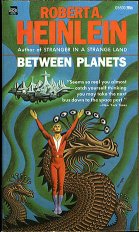
Between Planets
Robert A. Heinlein
190 pages
published in 1951
Between Planets is one of Heinlein's famous "juveniles", one in a series of books written for the American publisher Scribner in the late forties and fifties. These have been praised for/accussed of bringing entire generations of people to science fiction. Strangely enough, looking at the list found at http://members.iglou.com/jtmajor/HeinJuvs.htm, I've read very few of them, though I have read most of Heinlein's other novels and stories. This has more to do with lack of opportunity than lack of inclination; for some reason the Heinlein juveniles are hard to find here.
Between Planets seems to be a fairly typical Heinlein novel. It's not the best novel he has ever written, but it's far from the worst. As a writer, Heinlein was at the peak of his powers in the fifties: matured but not yet grown into some of the tics that would mar later books for me. And Heinlein at his best is an incredibly compelling writer, someone who demands your attention and doesn't let go until you've finished his book. Which for me was the case here. I started reading this during a lunch break, because the other book I was reading at the time didn't fit in my pocket; I only started reading that book again after I had finished this.
Part of the charm in reading this more then fifty years after first publication lies in visiting an old-fashioned future, a future that cannot happen anymore. Mars and Venus as habitable planets, complete with indigenous races, the way in which space travel is presented and the fact that this takes place some centuries in the future, but the societies presented do not differ all that much from mid-century America.
Not that any of this matters much. The thing Heinlein has always been able to do better than probably any other science fiction writer, is making you believe in the worlds he built. In any case, you cannot fault him for presenting an impossible Venus when it only became known to be impossible some time after Between Planets was published...
The story itself is a classic coming of age story. Don Harvey is one of the few people not born on a planet, but in space, between planets. His father is an earthman, his mother Venusian-born and both are scientists working on Mars, having sent Don to a boarding school in New Mexico, Earth, where he is only a few months from graduating. The story starts when he gets a phonecall while horseriding in the desert, calling him back to school to recieve the radiogram his parents have sent him. They want him back on Mars.
The reason they want him there is because war is threatening to break out between Earth and Venus. And the reason for that is a classic sort of Heinlein background. Earth has become decadent, oppressive, while the colonies on Venus are dynamic, free and itching for independence. Don, as somebody who holds both "nationalities", is caught in the middle.
The plot revolves around Don's attempts to get to Mars, not just to be with his parents again, but also to deliver a message from his "uncle" Dudley Jefferson, which lands him in a lot of trouble. It's all told a bit pell-mell though, with a lot of little sidesteps that don't go anywhere. Again though, this didn't matter much to me. The writing was good enough to pull me through the rough spots.
The theme of the story is of course Don's growing up, becoming an adult, a man instead of a boy. And he grows up because he has to choose between Venus and Earth, between repression and freedom. Being a Heinlein hero, he of course chooses correctly.
In some ways, while this is a decidedly oldfashioned story, it does resonate well with the current world climate, especially in its descriptions of repressive and security conscious Earth. Then there is the scene in which a Venusian calmly and rationally esplains that Venus will win the war, because it just wouldn't be cost effective for Earth to try and subdue them, only for the Earth troops to land in the very next chapter...
I would be remiss in this review if I didn't mention two other things: the first is the already refered to and oft mentioned fact that here Heinlein predicted the mobile phone, though it is still treated as if it were a landline. The second is "Sir Isaac Newton", the Venusian dragon, one of the more memorable aliens I've read about. Intelligent, rather mild mannered for his physique and calmly rational, "Sir Isaac Newton" is both alien and a recognisable in his own right.
The verdict? Not Heinlein's best novel, but certainly worth reading. Heinlein was an incredibly smart writer and the evidence for this is hidden in plain sight all over this novel.
